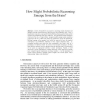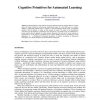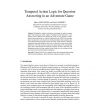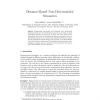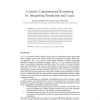111
click to vote
AGI
2008
15 years 3 months ago
2008
: A series of hypotheses is proposed, connecting neural structures and dynamics with the formal structures and processes of probabilistic logic. First, a hypothetical connection is...
108
click to vote
AGI
2008
15 years 3 months ago
2008
Many problems in AI study can be traced back to the confusion of different research goals. In this paper, five typical ways to define AI are clarified, analyzed, and compared. It i...
115
click to vote
AGI
2008
15 years 3 months ago
2008
Artificial Intelligence deals with the automated simulation of human intelligent behavior. Various aspects of human faculties are tackled using computational models. It is clear th...
AGI
2008
15 years 3 months ago
2008
We present a set of cognitive phenomena that should be exhibited by a generally intelligent system. To date, we know of few systems that address more than a handful of these phenom...
116
click to vote
AGI
2008
15 years 3 months ago
2008
Inhabiting the complex and dynamic environments of modern computer games with autonomous agents capable of intelligent timely behaviour is a significant research challenge. We illu...
121
click to vote
AGI
2008
15 years 3 months ago
2008
: Indefinite probabilities are a novel technique for quantifying uncertainty, which were created as part of the PLN (Probabilistic Logic Networks) logical inference engine, which i...
120
click to vote
AGI
2008
15 years 3 months ago
2008
Representing uncertainty and reasoning with dynamically evolving systems are two related issues that are in the heart of many information systems. In this paper we show that these ...
103
click to vote
AGI
2008
15 years 3 months ago
2008
Rich computer simulations or quantitative models can enable an agent to realistically predict real-world behavior with precision and performance that is difficult to emulate in log...
110
click to vote
AGI
2008
15 years 3 months ago
2008
Cognitive architectures play a vital role in providing blueprints for building future intelligent systems supporting a broad range of capabilities similar to those of humans. How u...
